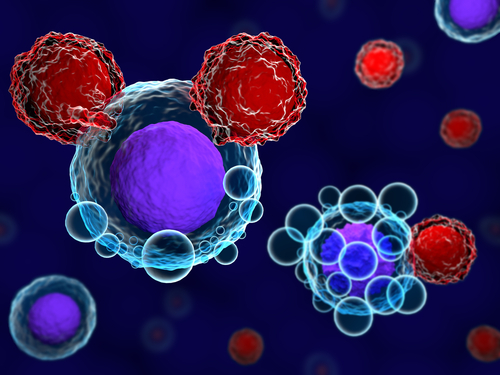Preliminary data from an ongoing Phase 1 trial suggest that Harpoon Therapeutics’ investigational therapy HPN424 is safe and effectively activates the immune system in metastatic castration resistant prostate cancer (mCRPC) patients.
The multicenter, international, open-label study (NCT03577028) is assessing the safety, tolerability and overall stability and distribution of HPN424 in about 40 adult patients with mCRPC.
“These initial results in advanced mCRPC patients suggest that HPN424 is activating T cells in a manner that is consistent with tumor target engagement,” Natalie Sacks, MD, chief medical officer of Harpoon, said in a press release.
HPN424, built with Harpoon’s TriTAC (Tri-specific T cell Activating Construct) technology, is meant to work as a connector between tumor cells and the patient’s own T cells. In particular, it binds the validated target PSMA protein — found in more than 90 percent of mCRPC lesions — and the CD3 molecule on T cells.
Harpoon designed HPN-424 to be the smallest T-cell engager to penetrate solid tumors with superior effectiveness, last longer in the blood, and recruit patients’ T cells to kill cancer cells.
“HPN424 is a novel T-cell biologic that has been designed to deliver potent T-cell killing to PSMA-expressing tumor cells. We are encouraged by the early human safety and pharmacology data emerging from our Phase 1 trial,” said Holger Wesche, PhD, chief scientific officer of Harpoon.
To date, seven patients have been included in Harpoon’s Phase 1/2 trial, all of whom had received prior treatment with a second-generation anti-androgen therapy, such as Zytiga (abiraterone) and Xtandi (enzalutamide).
They received ascending doses of HPN424 — ranging from 1.3 to 24 nanograms per kg — with the time of treatment ranging from one to more than 20 weeks.
Adverse events were consistent with the expected mechanism of action, with three patients experiencing moderate but manageable fever and rigors. One patient in the highest-dose group experienced a more severe cytokine release syndrome (CRS) event, which resolved within eight hours.
All patients who experienced adverse events were successfully re-treated after one week without further complications, and are still receiving weekly treatment with HPN424.
In addition to its positive safety profile, the investigational treatment also promoted T-cell activation, as measured by higher levels of specific inflammatory molecules, and reduced the levels of tumor cells in circulation. Also, among the three patients examined for efficacy, two achieved stable disease and one has an unconfirmed progressive disease, but continues on study.
After these promising results, researchers are now working to identify the safest and most effective dose of HPN424 for additional testing in Phase 2 studies.
“These results provide the first clinical evidence suggesting Harpoon’s TriTAC platform is performing as designed, by activating T cells in a target-dependent manner and by showing evidence of sufficient drug exposure during the treatment course to support once-weekly dosing,” Wesche said.
“We are excited by this early data for HPN424 and the broader application of our technology,” said Jerry McMahon, PhD, president and CEO of Harpoon. “We are looking forward to reporting additional clinical data from our ongoing HPN424 Phase 1 clinical trial in 2019 as we continue to enroll and analyze data from existing and new patients.”

